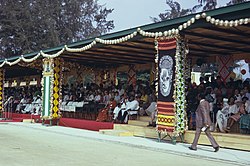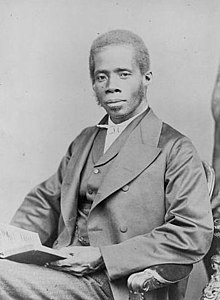Portal:Pan-Africanism
IntroductionWelcome to the Pan-Africanism portal!
Bienvenue sur le portail panafricanisme!   Pan-Africanism is a worldwide movement that aims to encourage and strengthen bonds of solidarity between all indigenous peoples and diasporas of African ancestry. Based on a common goal dating back to the Atlantic slave trade, the movement extends beyond continental Africans with a substantial support base among the African diaspora in the Americas and Europe. Pan-Africanism can be said to have its origins in the struggles of the African people against enslavement and colonization and this struggle may be traced back to the first resistance on slave ships—rebellions and suicides—through the constant plantation and colonial uprisings and the "Back to Africa" movements of the 19th century. Based on the belief that unity is vital to economic, social, and political progress, it aims to "unify and uplift" people of African ancestry. (Full article...) Selected articleNégritude is a framework of critique and literary theory, developed mainly by francophone intellectuals, writers, and politicians of the African diaspora during the 1930s. Its initiators included Martinican poet Aimé Césaire, Léopold Sédar Senghor (the first President of Senegal), and Léon Damas of French Guiana. Négritude intellectuals disavowed colonialism, and argued for the importance of a Pan-African racial identity among people of African descent worldwide. The intellectuals employed Marxist political philosophy, in the black radical tradition. The writers generally used a realist literary style, and some say they were also influenced somewhat by the Surrealist stylistics. In 1932, the manifesto "Murderous Humanitarianism" was signed by prominent Surrealists, including the Martinicans Pierre Yoyotte and J. M. Monnerot. Selected biography
Edward Wilmot Blyden (3 August 1832 – 7 February 1912) was an educator, writer, diplomat, and politician primarily in Liberia. Born in the West Indies, he joined the free black immigrants from the United States who migrated to the region. He taught for five years in the British West African Colony of Sierra Leone in the early 20th century. His writings on pan-Africanism were influential in both colonies. These were founded during the slavery years for the resettlement of free blacks from Great Britain and the United States. Blyden's writings attracted attention in the sponsoring countries as well. He believed that Zionism was a model for what he called Ethiopianism, and that African Americans could return to Africa and redeem it. He believed political independence to be a prerequisite for economic independence, and argued that Africans must counter the neo-colonial policies of former colonial powers. Selected history  The history of Africa begins with the emergence of hominids, archaic humans and – at least 200,000 years ago – anatomically modern humans (Homo sapiens), in East Africa, and continues unbroken into the present as a patchwork of diverse and politically developing nation states. The earliest known recorded history arose in the Kingdom of Kush, and later in Ancient Egypt, the Sahel, the Maghreb and the Horn of Africa. Following the desertification of the Sahara, North African history became entwined with the Middle East and Southern Europe while the Bantu expansion swept from modern day Cameroon (West Africa) across much of the sub-Saharan continent in waves between around 1000 BC and 0 AD, creating a linguistic commonality across much of the central and Southern continent. During the Middle Ages, Islam spread west from Arabia to Egypt, crossing the Maghreb and the Sahel. Some notable pre-colonial states and societies in Africa include the Ajuran Empire, D'mt, Adal Sultanate, Warsangali Sultanate, Kingdom of Nri, Nok culture, Mali Empire, Songhai Empire, Benin Empire, Oyo Empire, Ashanti Empire, Ghana Empire, Mossi Kingdoms, Mutapa Empire, Kingdom of Mapungubwe, Kingdom of Sine, Kingdom of Sennar, Kingdom of Saloum, Kingdom of Baol, Kingdom of Cayor, Kingdom of Zimbabwe, Kingdom of Kongo, Empire of Kaabu, Kingdom of Ile Ife, Ancient Carthage, Numidia, Mauretania, and the Aksumite Empire. At its peak, prior to European colonialism, it is estimated that Africa had up to 10,000 different states and autonomous groups with distinct languages and customs. From the mid-7th century, the Arab slave trade saw Muslim Arabs enslave Africans. Following an armistice between the Rashidun Caliphate and the Kingdom of Makuria after the Second Battle of Dongola in 652 AD, they were transported, along with Asians and Europeans, across the Red Sea, Indian Ocean, and Sahara Desert. Selected cultureThe term Caribbean culture summarises the artistic, musical, literary, culinary, political and social elements that are representative of the Caribbean people all over the world. The Caribbean's culture has historically been influenced by that of African and Amerindian traditions. It has also been strongly influenced by that of its linguistic, economic, and cultural neighbor, the United States. As a collection of settler nations, the contemporary Caribbean has been shaped by waves of migration that have combined to form a unique blend of customs, cuisine, and traditions that have marked the socio-cultural development of the area. Selected imagesOrganisationsAll-African People's Revolutionary Party · African Society for Cultural Relations with Independent Africa · African Unification Front · African Union · African Queens and Women Cultural Leaders Network · Conseil de l'Entente · Convention People's Party · East African Community · Economic Freedom Fighters · Global Afrikan Congress · International African Service Bureau · International League for Darker People · Organisation of African Unity · Pan African Association · Pan-African Congress · Pan Africanist Congress of Azania · Rassemblement Démocratique Africain · Pan Africa Chemistry Network · Pan African Federation of Accountants · Pan-African Freedom Movement for East and Central Africa · Sahara and Sahel Observatory · UNIA-ACL · ZANU–PF
See also
& Festivals Photo by Helinä Rautavaara (1977) Publications
Films and TVAudios and videosDid you know...that Henry V. Plummer was a chaplain with the US Army Buffalo Soldiers, while his son H. Vinton Plummer was a leader in Marcus Garvey's secret service and militia?
Selected quotesOn the subject of "Black self-hatred", the African-American scholar and Pan-Africanist Dr. Amos N. Wilson said:
Pan-Africanism topicsCategoriesThings you can do
Related portalsAssociated WikimediaThe following Wikimedia Foundation sister projects provide more on this subject:
Discover Wikipedia using portals | |||||||||||||||||||||||||||||||































